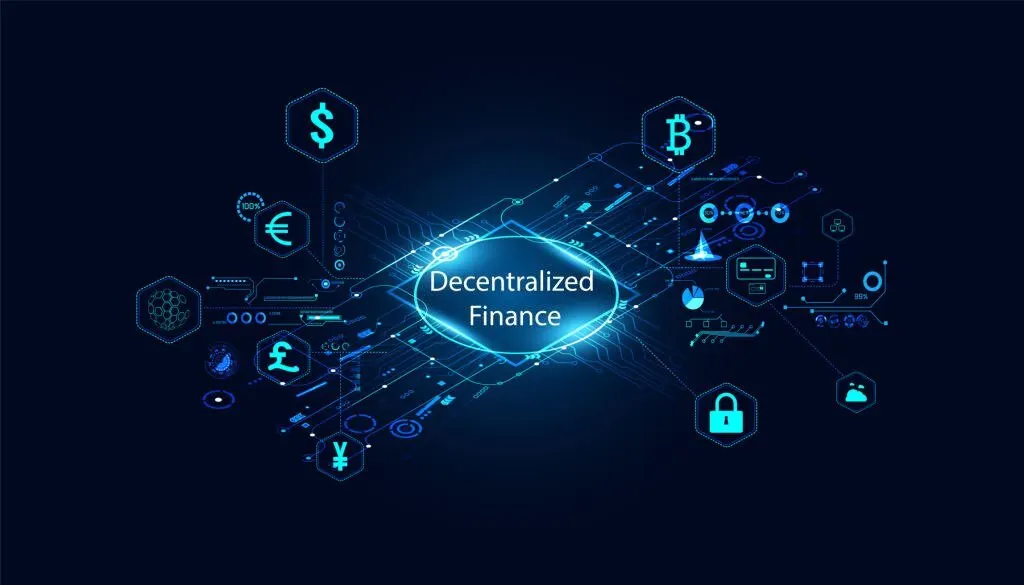The Growing Market of Decentralized Finance, Should You Stay or Stray?

Decentralized Finance (DeFi) has been gaining traction on the global financial stage for a while now, thanks to the new technology (blockchain) and changing attitudes toward cash and assets.
It is no secret that the traditional financial marketplace is inaccessible to the average person, with complex jargon and high fees discouraging the majority from investing in stocks, the rise of blockchain technology has identified the need for new approaches to investment and funding, resulting in a series of startups.
This article will explore the concept of decentralized finance, its benefits, and risks compared to traditional finance as well as recommendations to users on whether to stay or stray from this exciting, yet terrific financial system.
What is Decentralized Finance
Decentralized finance, also known as DeFi, is a financial system that is built on top of blockchain technology. It aims to provide financial services that are open, transparent, and accessible to anyone with an internet connection.
The use of blockchain technology in DeFi allows for the creation of financial products and services that are not controlled by any single entity, such as a bank or government. This means that DeFi has the potential to disrupt traditional financial systems and make financial services more accessible to people around the world.
The Benefits of Decentralized Finance
DeFi has several benefits compared to traditional finance, including:
- Lower fees
- Easy accessibility
- Greater control for users
One of the key benefits of DeFi is that it often has lower fees than traditional financial services. Since it is built on blockchain technology, it can often provide financial services at a lower cost than traditional financial institutions. This means that users can save money on fees, such as transaction fees or fees for using certain financial services.
Another benefit of DeFi is that it is more accessible than traditional finance. Because it is built on the internet, which means that anyone with an internet connection can access it. This is particularly important for people who may not have access to traditional financial services, such as those living in developing countries or unbanked individuals.
DeFi also provides greater control for users compared to traditional finance. Because it is decentralized, users have more control over their funds and can interact with the ecosystem without needing to go through a central authority. This means that users can make their own financial decisions without needing to rely on a third party.
Ultimately DeFi has the potential to provide greater financial inclusion and empowerment for people around the world. By making financial services more accessible and providing users with more control over their funds, it has the potential to enable more people to participate in the global financial system and gain access to the tools and services they need to improve their financial well-being.
The Risks Associated with Decentralized Finance
Although DeFi has many potential benefits, it also carries some risks that users should be aware of. Some of its potential risks include:
- Lack of regulation
- The potential for hacks and scams
- High volatility of DeFi assets.
The first risks of Decentralized Finance is the lack of regulation. Because DeFi is built on blockchain technology and is decentralized, it is not subject to the same regulations as traditional financial services. This means that users may not have the same level of protection as they would with traditional financial institutions.
Another potential risk of DeFi is the potential for hacks and scams. Like other internet services, it is vulnerable to security threats. This means that users' funds could be stolen if they are not careful. In addition, because DeFi is a relatively new and complex technology, there is a potential for scams and other fraudulent activities.
Finally, DeFi assets are often highly volatile, which means that their value can fluctuate rapidly. This can be a risk for users who are not prepared for the potential ups and downs of the DeFi market.
Decentralized Finance, Should you Stay or Stray? (Recommendation)
It is difficult to make a blanket recommendation on whether to stay or stray from decentralized finance, as the decision will depend on an individual's goals and risk tolerance.
On the one hand, decentralized finance offers many potential benefits, such as increased accessibility and transparency, reduced fees, and the ability to participate in financial markets without intermediaries. These features can make DeFi an attractive option for those looking to take control of their financial lives and access new investment opportunities.
On the other hand, DeFi also comes with inherent risks, such as the potential for technical failures or security breaches. The lack of regulation in the DeFi space can also make it difficult for investors to protect themselves and their assets. Additionally, the high volatility of many DeFi assets can make them risky for those who are risk-averse or not well-versed in the technology.
In conclusion, whether to stay or stray from decentralized finance will depend on an individual's goals, risk tolerance, and understanding of the technology. It is important to carefully evaluate the potential benefits and risks of DeFi before making a decision.